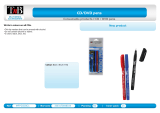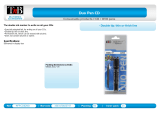
Using Your Pen or Finger as a Mouse
When you are in computer interactive mode, you can use
the pen or your finger as a mouse to interact with your
computer desktop.
Mouse function Pen/finger action
Left-click Tap on board
Double-click Tap twice
Right-click
Press pen button
Tap and hold finger for
3 seconds
Move cursor Hover over board
Click and drag Tap and hold on item, then drag
If your device supports these functions, you can also do
the following:
•
To zoom in or out, touch an item using two fingers and
either move your fingers away from each other (zoom
in) or toward each other (zoom out).
•
To rotate an image, touch the image with two fingers
and then rotate your hand.
•
To scroll up or down on a page, or move backward or
forward in a browser window, use swiping gestures or
flicks.
See the online BrightLink User’s Guide for more
information.
Having Trouble?
If the cursor does not match your pen or finger location,
follow the calibration instructions on the back of this card.
• On a Mac, you may need to open System
Preferences and select Displays. Click the
Arrangement tab and select the Mirror Displays
checkbox.
• Try pressing the Source Search button on the
remote control.
• Press the Home button on the remote control to
verify the source input and settings.
You may already have interactive software on your
computer, or you may need to install it. If you are using
a Mac, you need Easy Interactive Driver and Easy
Interactive Tools (or other interactive software). For
Windows, you only need Easy Interactive Tools (or other
interactive software).
Here’s how to find out if the Easy Interactive Tools
software is installed on your computer:
If you are using a Mac:
Look for the Easy Interactive Driver and Easy Interactive
Tools folders in the Application folder on your hard drive.
If you see these folders, the Easy Interactive software is
installed.
If you are using Windows:
Windows 10/Windows 8.x – Navigate to the Apps
screen or All Apps menu and look for Easy Interactive
Tools.
All other versions – Select or Start > All Programs
or Programs > EPSON Projector > Easy Interactive
Tools Ver. 4.2.
If you see Easy Interactive Tools, the software is installed.
If the software is not installed, do one of the following to
install it:
•
Use the CD that came with the projector, labeled
“EPSON Projector Software for Easy Interactive
Function”
•
Download the most up-to-date version from:
www.epson.com/brightlinkdownloads (U.S.)
www.epson.ca/brightlinkdownloads (Canada)
www.epson.com.jm/support (Caribbean)
For more information about Easy Interactive Tools, see
the online Easy Interactive Tools tip sheet or the online
BrightLink User’s Guide.
2
Interacting With the
Screen
Interactive Pens
Your projector came with 2 pens, one orange (Interactive
Pen A) and one blue (Interactive Pen B).
The pens have two different types of tips: a soft, felt tip
and a hard tip. Make sure one AA battery is installed in
each pen.
Battery
light
Button
Pen tip
(unscrew to replace)
Battery cover
•
To turn on the pen, pick it up. The blue light comes on
briefly. If the battery is low, the light flashes.
•
Hold the pen perpendicular to the board, as shown
below.
•
When you are finished using the pen, simply place it in
an area away from the projection screen.
Note: The pens turn off automatically after about 15
seconds of inactivity. Pick the pen up to turn it back on.
Finger Touch
You can use your finger to perform the same functions as
the interactive pen when the Touch Unit is installed. You
can use either the pen or your finger, or use both at the
same time.
When performing finger touch operations, you can use
two fingers in annotation and whiteboard modes, or up to
six fingers in computer interactive mode.
3
Using the Built-in Toolbar
The projector’s built-in toolbar lets you annotate images
from other devices that have been connected to the
projector, such as a document camera, tablet, or other
source. This is known as PC Free Annotation mode.
1
Press one of the source buttons on the remote
control to select the source for the image you want
to annotate.
Image from an
external device
connected to the
USB port
Image from a
computer connected
to the Computer1 or
Computer2 port
Image from a computer with
an HDMI connection, or a
video player
Image from a computer or
tablet connected through a
wired or wireless network
2
To activate the toolbar, tap the board with the pen or
your finger. If you don’t see the icon, tap the
icon and then tap the icon.
Note: If you only see the icon, you are already in
PC Free Annotation mode.
3
To close the toolbar, tap the icon at the bottom
of the toolbar.
Two different toolbars are available in PC Free Annotation
mode, one for annotation mode and one for whiteboard
mode.
Many of the tools are the same as Easy Interactive Tools,
but fewer functions are available.
•
Annotation mode displays the built-in toolbar on
whatever image is being projected.
•
Whiteboard mode lets you project a white or black
screen or background pattern, and use the pen
or your finger to write or draw as you would on a
chalkboard or dry erase board.
Select whiteboard
mode
Redo
Use custom pen
Select annotation
mode
Use black, red, or blue
pen—select small or
large dot for thin or
thick line
Clear all drawing
Close toolbar
Shows the current pen and
finger touch function
Undo
Use highlighter
Select the
background pattern*
Choose custom
color and width
Erase—select small
or large dot for thin
or thick eraser
Hide or show toolbar
while drawing
* In annotation mode, the select background tool does not appear.
1
Connecting Your
Computer and Installing
Interactive Software
1
Turn on the projector by pressing the blue power
button on the remote control.
2
Connect an HDMI or VGA cable from the projector to
your computer.
HDMI
VGA
Note: You can also display media through a USB
connection with the USB Display feature. See the
online BrightLink User’s Guide for more information.
3
Connect the USB cable from the projector’s USB
TypeB port directly to any available USB port on
your computer.
4
The default language of the menu system is English.
To select another language, press the Menu button
on the remote control. Select Extended and press
. Select Language and press . Select your
language and press . Press the Menu button to
exit the menu system.
5
Display an image from your computer. If the image
doesn’t appear, try one of the following:
• On some Windows
®
laptops, you may need to
hold down the Fn key on the keyboard and press
F7 or the function key that lets you display on
an external monitor. It may have an icon such as
, or it may be labelled CRT/LCD.
• On Windows 7 or later, hold down the Windows
key and press P at the same time, then click
Duplicate.










